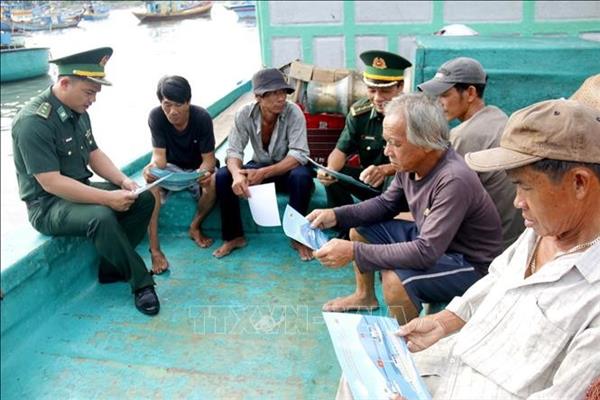Supply chains of timber, wood products, coffee, and rubber of many countries will encounter many challenges in meeting the EU Degorestation Regulation (EUDR). However, this is also a great opportunity for Vietnam to expand export markets if it is well prepared and satisfy the new rules.
Under the EUDR, to enter European markets, all agricultural products of Vietnam must have exact Global Positioning Systems (GPS) coordinates of their farms based on which any evidence of defrestation could be checked via remote sensing systems.
Timber and wood products, coffee, and rubber are among key foreign currency earners of Vietnam, bringing home more than 2.3 billion EUR (nearly 2.6 billion USD) in exports to Europe each year. About 47.5% of the revenue comes from coffee, 35.2% from wood, and 17.1% from rubber.
Therefore, Vietnam will be affected once the EUDR takes effect.
Addressing a conference on this issue held in Hanoi on June 29, Minister of Agriculture and Rural Development Le Minh Hoan affirmed Vietnam’s commitment to promoting green growth, noting the new rules of the EU will help the country enhance its sense of responsibility towards the world, and that green growth is an attitude not a slogan.
At this event, Florika Fink-Hooijer, Director-General of the Environment Department of the European Commission, highlighted the EU’s commitment to assisting Vietnam to sustainably develop and effectively deal with environmental challenges to contribute to the prosperity of the Vietnamese people and conserve the unique natural heritage of the country.
Nguyen Do Anh Tuan, Director of the International Cooperation Department at the agriculture ministry, held that Vietnam needs to seriously implement the requirements of the EU, which is an important market, especially for its coffee products.
The country will focus on developing sectors in a more sustainable, greener, and more responsible manner in order to improve the competitivenes of its farm produce in the EU compared to rivals from the countries yet adapting to the EUDR. That will also generate opportunities for farmers to improve their livelihoods, he noted.
Vietnam is about to issue a national-level action plan of the agricultural sector to meet the EUDR. So far, most of the sector’s branches have met EUDR standards. In particular, 70% of the coffee farming area is not related to forest, 20% adjacent to forest, and 10% in forest and in the risk group. Rubber and wood products have their own sustainable production certificates.
Nguyen Nam Hai, Chairman of the Vietnam Coffee - Cocoa Association (Vicofa), said that the country is currently home to about 650,000ha of coffee plants, most of which had been cultivated before 2020. If there is any coffee area linked with deforestation after December 31, 2020, it is very small.
Under the EUDR, operators and traders will have to prove that their products are both deforestation-free (produced on land not subject to deforestation after 31 December 2020) and legal (compliant with all relevant applicable laws in force in the country of production).
The majority of Vietnamese coffee is produced by smallholders, with about 1.2 million households involved, and the number of households owing less than 0.5ha is considerable, which poses great difficulties in origin tracing, he pointed out.
However, businesses, associations, and state agencies affirmed that they are ready to both cope with this challenge and seize opportunities it creates.
Tran Quynh Chi, Regional Director of Asian landscapes of the Sustainble Trade Initative (IDH), said that the EU requirement for tracing produce back to their farms will increase management, storage, and transporation expenses for businesses.
Major enterprises, especially foreign ones, have moved to build their own databases to prove their products meet the EU standards. But if businesses work by themselves, expenses will surge and farmers be the hardest hit, so IDH is coordinating with some domestic companies to pilot two origin tracing methods in three large coffee cultivation districts covering 110,000ha. One method is to trace origin back to the district and communal levels in low- or no-risk areas, which account for about 90% of the total coffee area in the three districts. The remaining 10% in risk areas will apply tracing origin back to farms.
Basing on the pilot methods, the relevant sides can estimate costs and the capability of meeting the requirements and devise measures for sharing with the EU, Chi added.
She went on to say that ministries and localities need to join actions to develop database and create conditions for origin tracing. Although most of Vietnamese coffee plants being harvested had been grown before December 31, 2020, the origins of this produce still have to be proved to the EU.
Tuan emphasised that businesses and associations should be well aware of this issue and create guidance, especially for how to build databases and provide information. Basing on those databases, they can reduce costs in developing production unit codes and tracing product origins. To do that, it is necessary to boost cooperation among all parties, from state agencies, enterprises to farmers, with support from domestic and foreign development organisations.
He noted the agriculture ministry has worked with the EU to call for the bloc’s support programmes helping the agricultural supply chains impacted by the EUDR. Aside from pledging to assist the forestry sector to carry out a programme on reducing or preventing deforestation and forest degradation via promoting the conservation, recovery and sustainable management of forest, the EU also promised to implement another to help agricultural branches improve their capacity to meet the EUDR.
Meeting the EUDR will be another step of Vietnam in climate change response, environmental protection, and economic development, Tuan added, citing Prime Minister Pham Minh Chinh as saying at the 26th UN Climate Change Conference (COP26) in the UK in late 2021 that Vietnam will not pursue growth at the expense of the environment./.


















